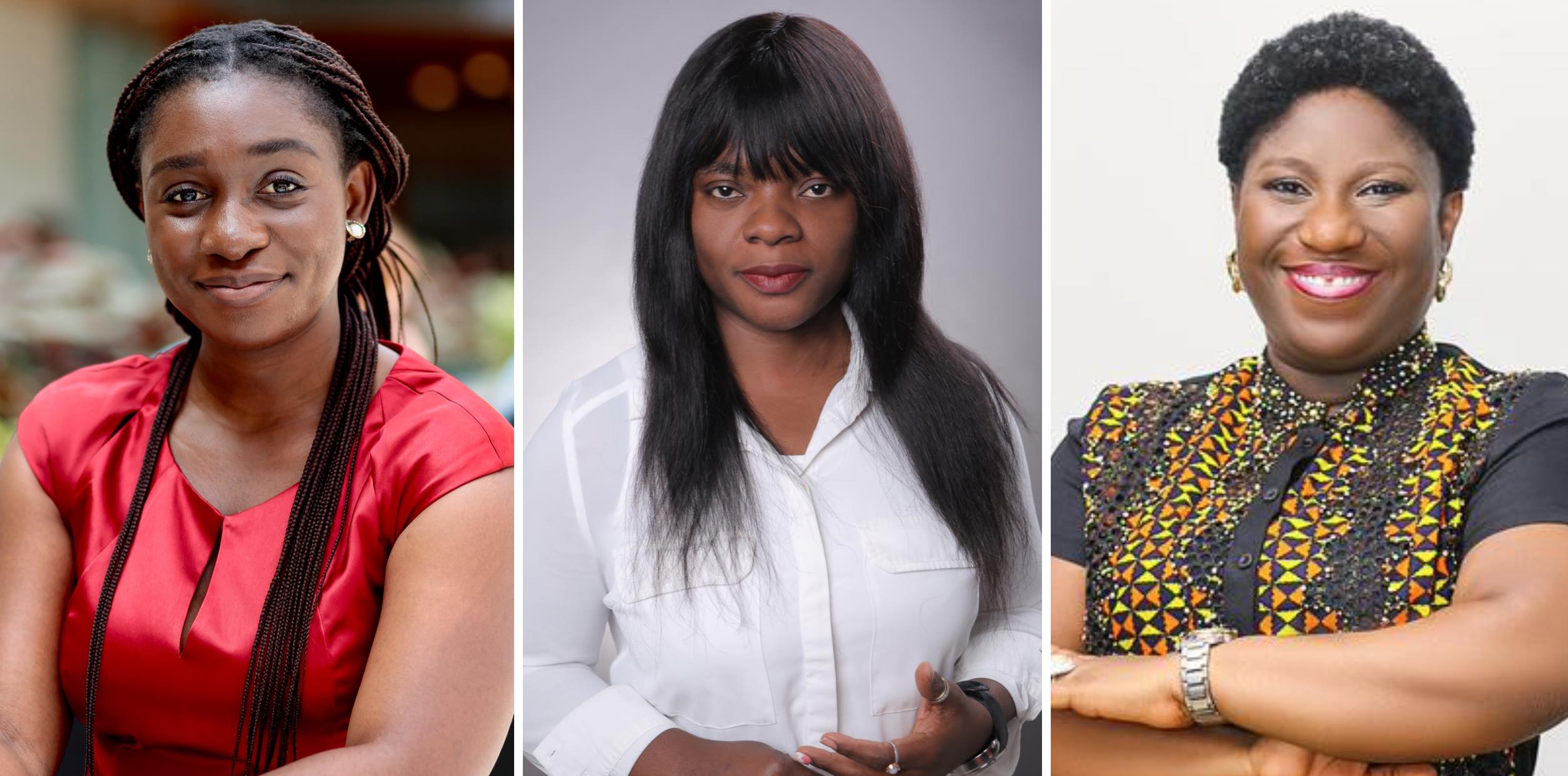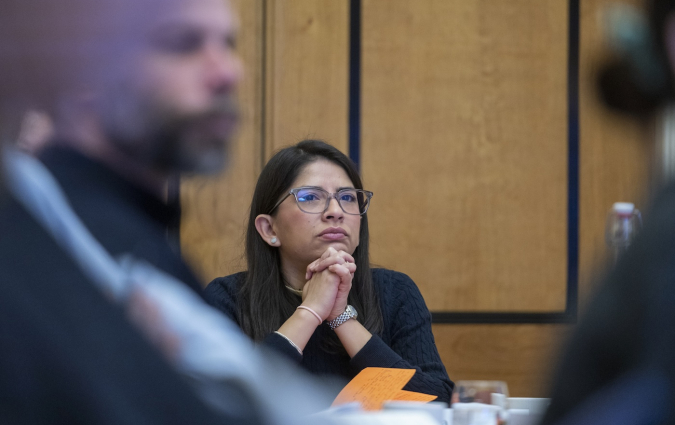In an industry mostly run by men, a few women are changing Nigerian newsrooms

Nigerian journalists Adesola Afolabi, Mercy Abang and Motunrayo Alaka.
Nigeria still has a male-dominated media industry. A 2017 survey showed a huge leadership gender gap in the country’s newsrooms, with a 10 to 2 ratio in favour of men in some cases. But Nigerian women journalists are starting to change this narrative and closing the gender imbalances. At the time of this writing, more than a dozen women journalists hold leadership positions in newsrooms or have launched their own news outlets. Here’s a portrait of some of these pioneering women who are changing the Nigerian journalism today.
A business editor
Adesola Afolabi started her journalism career by sheer luck. After she finished her bachelors degree in economics, she needed to land a job. The first offer she got was at Daily Times, Nigeria’s oldest newspaper. She worked there as a content manager for several years. When the paper was in its revamping stages, she accepted an offer to start writing about the stock market.
“It’s a journey of hard work and perseverance,” she said. “I am grateful that growth and promotions have come with it.”
In 2019, Afolabi was selected for the Reuters Institute’s Journalist Fellowship Programme. She attended an interactive session organised by the Institute which had members of the larger University of Oxford community in attendance. At the event, Afolabi met one of the co-founders at Stears Business, a Nigerian media outlet with a focus on business, economy and politics.
“From the exposure of world-class journalism and networking with other top journalists from around the world during the fellowship, I knew I no longer wanted to do business journalism the way I had been exposed back in Nigeria,” she said. “I wanted my writing to be relevant, meaningful and different from the regular reports that defined about 70% of my output before the fellowship.”
During her time in Oxford, Afolabi said she discovered her strength was in writing long-form, data-driven pieces which give readers more context and knowledge of the world around them. “So when I saw that Stears would allow me to do what I wanted and more, I applied for a role and thankfully, I got it,” she said.
In February 2020, Afolabi was appointed as the Deputy Editor of Stears Business. She said her position is an opportunity to collaborate effectively with teams in the entire group so that they can create the best information product for readers.
“I think of my role as the operations manager of the newsroom,” she said. “Aside from writing on topics that I’m passionate about such as personal to public finance, infrastructure and development, I manage the newsroom’s editorial calendar.”
She said the programme made a difference in terms of being considered for her current role and of preparing her for a leadership position. “I’ve always kept my eyes open for opportunities to grow,” she said. “Climbing to the top of anything in life takes grit. You just have to be determined. There has been a lot of hard work involved, tears and massive wins.”
Afolabi currently oversees the news output and works in the newsroom’s intelligence team. She said their work differs across each intelligence team subset, which can be separated based on the users they serve. For instance, the advisory team is focused on building products for our enterprise users, while the editorial team focuses on consumer-facing products. Overall, the intelligence team produces data-driven insights and analysis on African economies with emphasis on Nigeria, Africa’s largest economy.
“I’m the person that ensures we hit our daily publishing targets,” she said. “Most of our stories include charts. I am also responsible for reviewing these charts and ensuring every aspect aligns with our high-quality publishing standards. These tasks are a collaborative effort with every member of the intelligence team.”
Afolabi said she is passionate about business journalism to help readers and policymakers understand the economy around them and make better decisions.
“I find joy when people send messages and say they had no idea why specific economic problems couldn’t be fixed or how other nations have solved the challenges we are currently experiencing,” she said. “They usually say my stories gave them a research idea or explained things in a way they could finally understand.”
Afolabi’s mission as a business journalist is to use her stories to find solutions to Africa’s economic problems.
“Making sense of the million things wrong in the African economy is the first step to finding sustainable solutions,” she said. “Writing about how businesses find solutions to the problem or how policies hinder these solutions are ways of documenting issues that can lead to progress in the country or on the continent.”
Leading a non-profit
Motunrayo Alaka has been leading the programmes at the Wole Soyinka Centre for Investigative Reporting (WSCIJ) since 2005. WSCIJ is a non-profit media organisation with a focus on supporting investigative journalism, strengthening accountability and promoting social justice. Alaka has led the organisation for most of its existence and currently serves as the chief executive officer, the first woman to hold such a position.
She trains and mentors journalists to produce stories that hold the government accountable and expose corruption in areas such as the energy sector, women and girls issues and immigration. Under Alaka, WSCIJ has trained more than 2,000 journalists and has supported over 1,400 stories. When she came on board, the organisation had only two programmes. Now it supports ten.
In 2014, Alaka launched the Report Women! Project with support from the Netherlands Embassy. “We wanted to improve the quality and the number of reports about girls and women,” she said. As a result, more than 40 stories have been produced on topics such as access to education, gender abuse and political power to empower women.
In 2017, the initiative expanded with the launch of the Female Reporters Leadership Programme [FRLP] in partnership with Free Press Unlimited. Their goal is to prepare women reporters for leadership roles. More than 50 women have graduated from the programme and are already making an impact.
Alaka said the programme has three components: engaging newsroom leaders, intervening through training and disrupting newsroom imbalances. “We realised that we needed to be intentional about changing media leadership,” she said. “We train women on leadership, confidence, presentation and gender inclusion so that they can write stories that are nuanced and have voices of women as leaders and not just victims.”
Alaka and her team conduct research on gender imbalances in newsrooms in Nigeria with the aim of knowing how to respond to them with targeted programs that provide female journalists with the skills they need and tailor issues, narratives and peculiarities to the Nigerian media environment. She also engages with partners and funders willing to support the work of her team. “Much of what I do is building relationships so that we can get the right resources and the right kind of input to train reporters at the highest standards,” she said.
With support from the Gates Foundation, Alaka’s organisation is working on an initiative to increase the number of women in news and in newsroom leadership positions. “We don't just want women as victims,” she said, “We want women as leaders and expert sources, and also as newsroom leaders. It’s a moral, professional and sustainability issue. We need to give women the opportunity to lead alongside men. News media can increase its audience by being more nuanced and inclusive.”
It was not easy for Alaka to start out a career in media management. She recalls attending board meetings in which all the other members were male and older. “If you have a good idea, you have to share it because society benefits when you share knowledge,” she told me. “It was what I brought to the table that helped me grow. So I always try to collaborate with others and bring value to the communities I’m in.”
Rising above challenges
In 2013, Mercy Abang was a managing director at Citizens Platform, a Nigerian media company when she decided to launch NewsWire, an online publication that prioritises underreported stories. The platform is now one of the leading media outlets in Nigeria, with dozens of news and analysis focusing on a wide variety of topics from tech to security, environment, poverty, health, corruption, civic space, social justice and human rights.
Despite funding challenges, Abang is happy with her decision. She says that it was motivated by the need to “tell underreported and development stories away from what we see” and that the platform has been driven by “dedicated individuals who joined” and gave their all at all times. “You can imagine how difficult that can be for a small platform without ads,” she said.
Abang is also the CEO of Hostwriter, a Berlin-based cross-border journalism organization that provides opportunities for journalists to collaborate with their colleagues around the world. In addition, Abang, alongside her colleagues, helps to manage Unbias the News, a remote feminist newsroom launched last year with the aim of providing a platform and safe space for cross-border journalists to tell underreported stories from around the world.
Despite challenges, women journalists in the Global South are finding ways to grow while providing mentorship to younger journalists starting out in their careers.
“I learn and grow through these challenges,” Afolabi said. When she started her career as a journalist in 2015, she recalls being confused on how things work. But being open to learning made the process less complicated. Her newsroom, she said, is passionate about this learning culture and members of the team are typically in one or more forms of daily training, knowledge sharing and critical thinking sessions.
“You have to be willing to learn,” she said. “Learning and putting any learnings to work gives you the edge to understand things better. The good thing is that any work pays off as it builds a character that can thrive in leadership positions.”
Abang said that it’s important to acknowledge male journalists who looked beyond the stereotypes and considered the skills and curiosity of women, including a former boss who gave her the first role in broadcasting where she garnered additional skills.
She added that traditional women's roles should change. “More often than not, women are either sent to report on women affairs, entertainment and all those beats considered for women,” she said. “However, this is changing. We need men to look at what women can offer and to hand them the baton to thrive.”
Alaka is sometimes addressed as “Mr” in emails because the senders expect a man in her role. “Society makes people assume that leadership roles are to be held by men,” she said. “If you have a policy that says, 50 percent men and 50 women in leadership, then women will not have as many challenges as they do now.”
It’s important to stress that women journalists also work in high-pressured environments, said Ijeoma Nwogwugwu, managing director of Arise News Channel Africa. “Women had to contend with family roles and work twice as hard to prove themselves. The nature of our job requires us to work sometimes late into the night and this has an impact on family life.”
With a growing number of female students interested in becoming journalists, Afolabi has two pieces of advice for them: be assertive and form networks. “I would also tell them to ask questions and share any opinions they have. When you do those things, it expands your learning possibilities,” she said. “At some point, it may appear like no one is listening to you or reading the important stories you’ve spent time investigating and researching. But keep at it because these are important stories and someone out there is reading. In the long run, it’s not in vain.”
In every email we send you'll find original reporting, evidence-based insights, online seminars and readings curated from 100s of sources - all in 5 minutes.
- Twice a week
- More than 20,000 people receive it
- Unsubscribe any time







